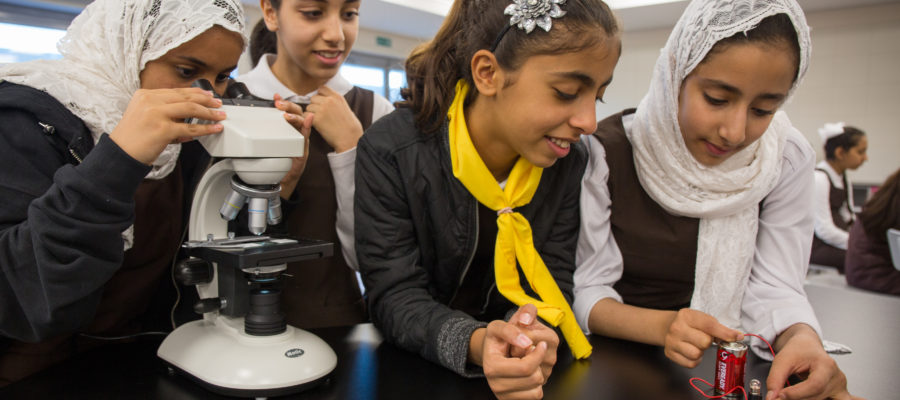Teenagers Today
According to Diana Divecha, Ph. D. in developmental psychology, “every generation of teens is shaped by the social, political, and economic events of their time”. So the first question to ask ourselves, as educators of this generation, is: What events are shaping the current generation of teens?
Our adolescents live in a world facing climate change, destruction of nature, conflict, inequality, lack of food and water, among many other issues of global concern. Teenagers’ lives are also saturated with technology and social media. These events are shaping them. They certainly face uphill battles, so further questions arise: Are they ready to face them? Are they concerned about these issues? Is education catering to the needs and demands of a different teen generation?
Education for a new teen generation
Understanding our teenagers is the first step towards an education that will suit them. Understanding their mindsets, their lifestyles, their interests and motivations, their concerns and their behaviors is critical.
In their teenage years, people are creating their identity, they are trying to figure out who they are and what they want to be. Their social relationships mean everything to them and they heavily look up to peers and role models.
The good news is that many of today’s teens are activists, with Greta Thunberg as the most well-known example of a teenager taking action against climate change. So in a world facing problems that are global in nature, and demand cross-border perspectives and solutions, what should education for teenagers look like?
Global Citizenship Education & Education for Sustainable Development
Having inherited these huge global challenges mentioned above, this generation needs a toolkit of real-life skills, innovative thinking, and mutual understanding.
Global Citizenship Education (GCE) understands that students are part of a globalized world, in which individual choices and actions have repercussions locally, nationally and internationally. GCE aims at raising teenagers well equipped to:
- Solve problems
- Make decisions
- Think critically
- Communicate effectively
- Work collaboratively with others
- Respect and value diversity
- Make the world a more equitable and sustainable place
Education for sustainable development (ESD), within the nuclear family of GCE, aims at empowering teenagers as they are taught to:
- Learn to know
- Learn to be
- Learn to live together
- Learn to transform oneself and others
GCE and ESD in action
What do GCE and ESD look like in the classroom? First and foremost, this is all about including sustainable development issues (social, economic and environmental) into our teaching and learning and encouraging participatory learning by providing meaningful opportunities for teens to:
- Work in teams, tackling projects dealing with real-life issues.
- Ask and attempt at answering tough questions and work through problems.
- Apply their knowledge by teaching others, talking to others, communicating their thoughts and findings.
Content as the Language Propeller
In the English language classroom, bringing real places, people, topics to the classroom provides priceless opportunities for real use of language. Through discussion, reading, watching videos, working on tasks and projects, students will be able to make grammar and vocabulary meaningful to them as they will make them functional in an international language.
Students will be able to:
- Express their beliefs, assumptions, and knowledge.
- Ask for and give information.
- Give their opinion.
- Compare and contrast.
- Agree and disagree.
- Suggest.
- Express feelings and emotions.
- Persuade
For example:
In a unit in Impact about bioluminescence and living in places whether there is light or darkness for long periods, the content provides many language opportunities for students to use functions such as:
- Telling
- Retelling
- Explaining
- Comparing, contrasting
- Describing


In a Time Zones unit on fun jobs, students are asked to talk to their partners about the jobs they would love to do.
Students have the opportunity to:
- Express likes and dislikes
- Compare and contrast
- Describe
- Give information


Humberto Maturana says the future doesn’t belong to teens, it belongs to the adults who raise these teens, live with them and educate them. The future of mankind, he claims, are not children, but the adults with whom children live and are guided by.
Our children and teens are the future, they can be the agents of change, but they cannot do this alone. They need us.
Make sure to watch the full recording of Luciana’s webinar Empowering Teenagers to Be the Change the World Needs to learn more!



Thank you mem. Really I have known many things from this topics,
Amazing I appreciate your contribution for the teens..
First of all the course is mentioned for teens age and how to adapted themselves with critical problems simply because future for them ,according to my experince for teaching more than 30years for teens as an english teacher graduated form institute training for teens age in Sudan the generations are different. Now they link to media the clear point that they change government in Sudan youth because they refused the way of classical learning this not direct point but poverty and the lack of future are other reasons that clearly they effected by the decreasing of socail needs.
I am living in Venezuela, most of the time without internet, I apreciate those histories.I will show them to padawans!
Global Production Engineering (GPE) is a great future opportunity!
Many thanks for your enlightening words; it’s a reminder of who we are supposed to be as teachers and adults in charge of our great kids and teens.
Thank you very much.it’s very useful information